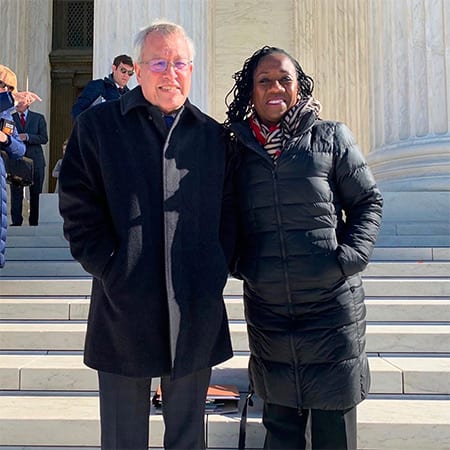By Andrew Cohen

On Nov. 13, Berkeley Law Dean Erwin Chemerinsky argued before the U.S. Supreme Court in Comcast v. National Association of African American-Owned Media.
At issue: the right legal standard for evaluating racial discrimination claims in contracting. Chemerinsky advocated for Entertainment Studios Network, owned by African-American entrepreneur and entertainer Byron Allen, which asserts that racial bias fueled Comcast’s decision not to carry seven of the network’s lifestyle cable channels in violation of the Civil Rights Act (Section 1981).
Making his seventh argument at the Supreme Court, Chemerinsky contended that for such claims to move forward, a plaintiff should only have to show that race was plausibly a “motivating factor” in the defendant’s decision—the threshold the U.S. Ninth Circuit Court of Appeals approved last year.
Comcast argued that the complaint itself must assert that the defendant’s decision would have been different but for the plaintiff’s race—otherwise the complaint should be dismissed. The company stated that its decision not to add Allen’s channels came from determining that there was little demand for them, and had nothing to do with race.
“Arguing before the Supreme Court is always thrilling and always frustrating,” Chemerinsky says. “There’s never time to answer one question before the next one. I felt good about the argument and the chance to explain to the Court the importance of keeping the courthouse doors open to victims of racial discrimination.”
The Supreme Court oral argument sparked an outpouring of media coverage, some of which described how the justices’ questions and comments seemed to favor a more complete evaluation of the plaintiff’s contentions rather than fixating on a specific standard.
Reporting for the Los Angeles Times, David Savage wrote that “the justices sounded ready to send the suits back to Los Angeles to allow them to proceed in federal court—but without weighing in on who should win in the end.”
In The New York Times, Adam Liptak reported that the court “seemed to be looking for a narrow way to rule.” Although civil rights groups have expressed concern that the court could use the case to limit the reach of anti-discrimination laws, Liptak wrote, “there was little evidence at Wednesday’s argument that the justices were inclined to make a sweeping ruling.”
Andrew Chung of U.S. News & World Report noted that “several justices raised doubts that the standard to sustain a lawsuit should be as stringent as Comcast suggests.” He went on to write, however, that both liberal and conservative justices “raised questions indicating that the appeals court decision siding with Allen may have to be set aside and reconsidered in light of their eventual ruling.”
Wall State Journal reporter Jess Bravin, a 1997 Berkeley Law graduate, wrote that Comcast “faced a skeptical Supreme Court … where several justices suggested there was enough in Byron Allen’s allegations to get his case into court.”
Allen told Cynthia Littleton of Variety “he was pleased with how (the oral argument) unfolded for his legal team, led by Erwin Chemerinsky … Allen said the pointed questions from the justices indicated they recognized the significance of the legal question about the standard Allen would have to prove to prevail in the suit, first filed in early 2015. ‘This case is bigger than me,’ Allen said. ‘The civil rights of 100 million Americans are at stake in the question of what legal standard to use. This is a very important decision.’”
Additional media reports about the oral argument have appeared in the Washington Post (including a second story here), Deadline, Reuters, CNBC, Black Star News, Marketplace, Law360, the Charleston Chronicle, and NBC News.
The Supreme Court is expected to rule on the case this summer.